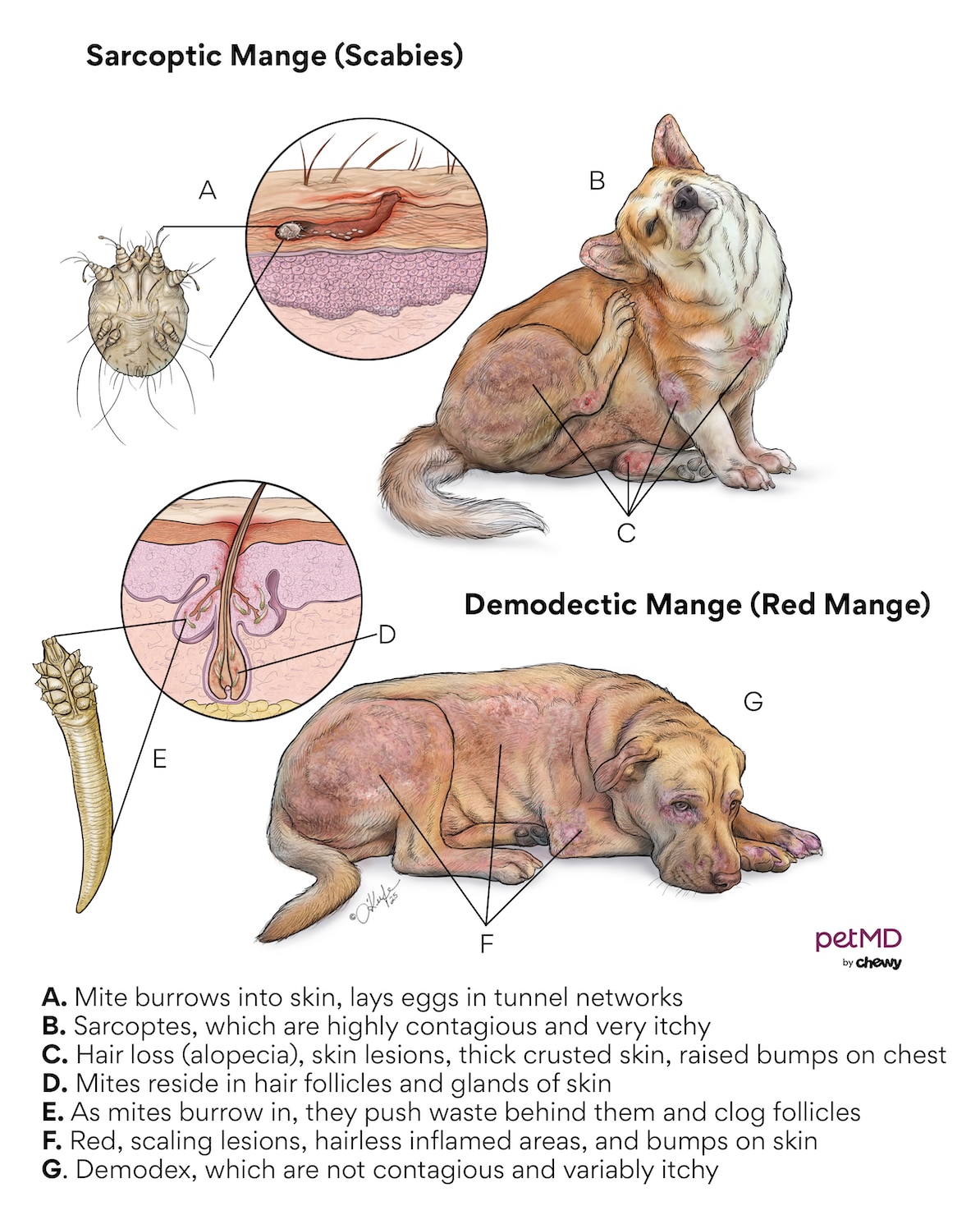Demodectic Mange in Dogs
What Is Demodectic Mange in Dogs?
Demodectic mange, also known as red mange, is a parasitic skin infection caused by mites such as Demodex canis (most common), Demodex injai, or Demodex cornei. Under the microscope, it appears cigar-shaped with eight short legs.
This type of mite is a normal inhabitant of the hair follicle, though it is usually not harmful. If the immune system is healthy, these mites cause no harm to their host. Dogs with immature or compromised immune systems that allow this mite to overgrow will develop clinical signs such as hair loss and red, scaling skin lesions.

Click here to download this medical illustration.
The mite normally lives in low numbers in the hair follicles of the skin. Demodex is most often transmitted from mother to puppy while suckling milk because of the pup’s immature immune system. Exposure of a normal, healthy dog to one with demodex is not dangerous. Demodectic mange is not contagious between other dogs as it requires a depressed immune system to develop.
Demodectic mange cannot spread from dogs to humans.
Symptoms of Demodectic Mange in Dogs
Clinical signs of demodectic mange include:
-
Alopecia (hair loss)
-
Skin scaling
-
Bumps on the skin (papules)
-
Pigmentation of the skin
-
Thickening of the skin
-
Itchiness varies depending on secondary skin infections or if the lesions are localized to a certain area or are generalized over the body.
In puppies, lesions often begin around the face and head due to feeding from the mother’s teat, but lesions can be found anywhere on the body. In more severe cases of generalized demodectic mange, pain, lethargy, fever, draining wounds, and skin swelling may be noted. Ear infections are also possible if the mite invades the ear canals.
Causes of Demodectic Mange in Dogs
Demodectic mites typically live on the skin and benefit from their host while causing no actual harm to their host. Mange occurs, when the mite overgrows at the hair follicle, often in those with weaker immune systems such as puppies, whose immune systems are still forming, and older dogs with underlying illnesses leading to depressed immune systems.
Demodex lives on all our skin, even in normal healthy dogs and humans. When the immune system is depressed, it overgrows causing itching and mange. Normally this mite is only passed between dogs as puppies and is most often passed from mother to puppy.
How Veterinarians Diagnose Demodectic Mange in Dogs
Mange is most commonly diagnosed through skin scraping or hair plucking, and cytology. This is a non-invasive test that involves using a scalpel blade and scraping the skin deep enough for mild irritation or bleeding to be noted (this is necessary since demodex lives deep in the hair follicle) or simply removing hair at the root for assessment. The sample is assessed under the microscope. The presence of any mites is considered a positive result.
Some mites can be found through fecal flotation or fecal testing because the dog ingests them while licking/chewing the skin.
Polymerase chain reaction (PCR) testing can also be performed, but it can warrant false negative results and is often not necessary when diagnosis is evident.
Finally, skin biopsy may be necessary in cases where the dog is not responding to therapy or if a diagnosis undetermined with other less invasive diagnostic tests. Biopsy is sometimes considered in more severe, generalized cases of demodex.
Treatment of Demodectic Mange in Dogs
Not all cases of demodectic mange require treatment. Most cases of demodectic mange that are localized to a small region of the body will spontaneously resolve in 1-2 months with no treatment. Other cases of localized infections can be treated with topical medication such as moxidectin and imidacloprid.
If demodectic mange becomes generalized, medication is recommended for resolution of symptoms. Miticidal treatment (oral or topical) is the most common type of therapy, including ivermectin, milbemycin, doramectin, amitraz, fluralaner (Bravecto), afoxolaner (Nexgard), sarolaner (Simparica), and lotilaner (Credelio). Dogs with MDR1 mutations should never receive ivermectin. This mutation can be determined through genetic testing.
Miticidal therapy is continued until two consecutive negative skin scraping or hair plucking tests occur. Special shampoos containing benzoyl peroxide are often recommended as these open and flush the hair follicles to allow dip and topical treatments to penetrate more efficiently. You should discuss the risks and benefits of these medications with your veterinarian before beginning to use them.
Secondary skin infections due to inflammation can occur and require antibiotic therapy. It may be necessary to treat the skin infection before clearing the demodectic mange.
It is also recommended to stop breeding dogs with generalized demodex infections as the disease is thought to have an underlying genetic and/or immune system cause that contributes to the overgrowth of mites.
Recovery and Prevention of Demodectic Mange in Dogs
Most dogs with mange recover well with appropriate therapy in a timely manner. Secondary infections and underlying systemic illness are often the culprits in dogs that require chronic treatment.
Mange can be fatal in dogs who receive inappropriate therapy or whose underlying medical conditions are not well managed.
Demodectic mange does not require environmental cleaning as it does not typically transmit between dogs, though a monthly or tri-monthly miticidal preventative is still recommended. Dogs should remain on regular miticidal preventatives to avoid infection from other types of mites, fleas, and ticks unless otherwise directed by your veterinarian.
Demodectic Mange in Dogs FAQs
Is demodectic mange contagious to humans?
Demodectic mange is not contagious to humans.
How long does it take for demodectic mange to go away?
It can take weeks to months for demodectic mange to resolve depending on whether it is a localized or generalized infection and whether there are any secondary infections or underlying illnesses. Every dog will react differently to medications, so there is no exact timeline for resolution.
Does mange go away on its own?
Demodectic mange can resolve on its own in mild cases. It usually takes 1-2 months for mild, localized infections to resolve spontaneously.
How long is a dog contagious with demodectic mange?
Dogs with demodectic mange are not contagious to other dogs, pets, or humans.
Featured Image: iStock.com/Todorean Gabriel
